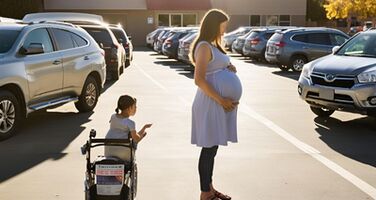
What Qualifies You for a Disabled Parking Permit During Pregnancy?
Pregnancy is a time of joy and anticipation, but it also brings a range of physical challenges that can make daily activities more difficult. For some women, these challenges are severe enough to warrant the need for a disability pass, allowing easier access to parking and reduced physical strain. While being pregnant itself is not typically considered a disability, there are specific conditions and situations that may arise during the motherhood journey that can qualify someone for a disability pass.
This article will outline the conditions that may qualify a pregnant woman for a handicap tag, the process of applying for one, and how these passes can significantly improve quality of life during a challenging pregnancy.
Understanding Disabled Parking Permits
Before diving into the specifics of how expecting a child can qualify someone for a disability pass, it's important to understand what these tags are and how they function. A disabled parking permit, also known as a handicap placard or parking pass, is a special pass that allows individuals with temporary or permanent disabilities to park in designated spaces closer to building entrances. These spaces are often wider and more accessible, reducing the physical demands on individuals with limited mobility.
Types of Disabled Parking Permits
There are typically two types of disability passes:
Permanent: Issued to individuals with permanent disabilities that significantly impact their mobility.
Temporary: Issued to individuals with temporary disabilities or conditions that impair mobility for a limited period. These passes are often valid for a few months to a year and can be renewed if necessary.
Pregnancy-related complications that affect mobility generally qualify for a temporary disability tag. The criteria for obtaining these passes vary by state and country, but the underlying principle is that the condition must significantly impair the individual's ability to walk or move around.
Understanding the Challenges of Pregnancy
Being pregnant involves profound changes in a woman's body, many of which can affect mobility. Common symptoms such as swelling, fatigue, and pelvic pain are well-known, but some women experience more severe complications that can make it difficult to perform everyday tasks, including walking, standing for long periods, or navigating stairs.
Common Pregnancy Symptoms Affecting Mobility
While many gestational symptoms are manageable, some can severely impact a woman’s ability to move comfortably. These symptoms include:
- Swelling (Edema): Fluid retention in the legs and feet can cause significant discomfort, making it painful to walk or stand for long periods.
- Back Pain: The added weight of the pregnancy and changes in posture can lead to chronic back pain, limiting mobility.
- Pelvic Pain: Conditions such as symphysis pubis dysfunction (SPD) can cause severe pain in the pelvic region, making walking or even sitting uncomfortable.
- Fatigue: Being pregnant can lead to extreme fatigue, particularly in the later stages, making it difficult to engage in physical activity.
Pregnancy Complications That May Qualify for a Disabled Parking Permit
Certain complications that arise during the maternal phase can make a woman eligible for a handicap placard. These complications can significantly impair mobility and make it difficult to perform everyday activities without assistance.
1. Preeclampsia
Preeclampsia is a gestational complication characterized by high blood pressure and signs of damage to another organ system, often the liver and kidneys. It usually occurs after 20 weeks of pregnancy and can lead to serious complications if not properly managed.
How Preeclampsia Affects Mobility
- Severe Swelling: One of the most common symptoms of preeclampsia is edema, particularly in the legs, feet, and hands. Severe swelling can make walking painful and difficult, as the fluid buildup puts pressure on the joints and nerves.
- Headaches and Visual Disturbances: Preeclampsia can cause severe headaches and visual disturbances, which can affect balance and coordination, making it challenging to move safely.
- Fatigue and Weakness: The increased blood pressure and strain on the body can lead to extreme fatigue and muscle weakness, further impairing mobility.
Qualifying for a Disability Tag
If a woman is diagnosed with preeclampsia and experiences significant swelling or other mobility issues, she may be eligible for a temporary handicap tag. A healthcare provider can assess the severity of the condition and determine if a pass is warranted to help manage the physical demands when expecting.
2. Gestational Diabetes
Gestational diabetes is a type of diabetes that develops during pregnancy and usually resolves after childbirth. It can, however, have significant implications for both the mother and the baby if not properly managed.
How Gestational Diabetes Affects Mobility
- Peripheral Neuropathy: High blood sugar levels can damage the nerves in the extremities, leading to peripheral neuropathy. This condition causes numbness, tingling, and pain in the feet and legs, making walking painful and difficult.
- Increased Risk of Infections: Gestational diabetes increases the risk of infections, particularly in the urinary tract and feet. Foot infections can severely impact mobility and may require immediate medical attention.
- Fatigue and Lethargy: The body's inability to efficiently use glucose for energy can lead to fatigue and lethargy, reducing overall stamina and making walking more taxing.
Qualifying for a Disability Tag
If gestational diabetes leads to significant mobility issues, such as severe nerve pain or swelling, a temporary handicap tag may be recommended. A healthcare provider can evaluate the severity of the symptoms and determine if a pass is necessary to help the pregnant woman manage her daily activities more comfortably.
3. Symphysis Pubis Dysfunction (SPD)
Symphysis Pubis Dysfunction (SPD) is a condition where the ligaments that normally keep the pelvic bone aligned become too relaxed and stretchy too soon before birth. This condition can cause significant pain and affect mobility, especially when walking.
How SPD Affects Mobility
- Pelvic Pain: SPD causes pain in the pelvic area, particularly at the front where the pelvic bones meet (the pubic symphysis). This pain can make it difficult to walk, climb stairs, or even stand on one leg.
- Waddling Gait: Many women with SPD develop a characteristic waddling gait as they try to reduce the pain while walking.
- Reduced Range of Motion: The pain and instability in the pelvic region can limit the range of motion in the hips and legs, making it difficult to perform daily activities.
Qualifying for a Disability Tag
If SPD causes severe pain and significantly limits mobility, a pregnant woman may be eligible for a temporary accessible pass. A healthcare provider can evaluate the severity of the condition and determine if a pass is necessary to help the woman manage her mobility challenges during the baby bump journey.
4. Severe Sciatica
Sciatica is a condition characterized by pain radiating along the sciatic nerve, which runs down one or both legs from the lower back. During the maternal phase, the growing uterus can put pressure on the sciatic nerve, leading to severe pain and mobility issues.
How Sciatica Affects Mobility
- Pain: The most significant impact of sciatica is severe pain, which can be sharp, burning, or shooting down the leg. This pain can make it difficult to stand, walk, or even sit comfortably.
- Numbness and Tingling: Sciatica can also cause numbness, tingling, or weakness in the leg, making it hard to maintain balance and coordination while walking.
- Muscle Weakness: Over time, the pain and discomfort associated with sciatica can lead to muscle weakness in the affected leg, further impairing mobility.
Qualifying for a Disability Tag
If a pregnant woman experiences severe sciatica that significantly limits her ability to walk or perform daily activities, she may qualify for a temporary accessible pass. A healthcare provider can assess the severity of the sciatica and recommend a pass if it would help alleviate the physical strain on the woman.
5. Hyperemesis Gravidarum
Hyperemesis gravidarum is a severe form of morning sickness that involves intense, persistent nausea and vomiting during gestation. This condition can lead to dehydration, weight loss, and nutritional deficiencies, significantly impacting a woman’s ability to function and move normally.
How Hyperemesis Gravidarum Affects Mobility
- Severe Fatigue: The constant nausea and vomiting can lead to severe fatigue, making it difficult to engage in physical activity.
- Weakness: Dehydration and nutritional deficiencies can cause muscle weakness, further impairing mobility.
- Dizziness and Fainting: The lack of proper nutrition and fluids can cause dizziness and fainting spells, making it dangerous to walk or stand for extended periods.
Qualifying for a Disability Tag
Given the severe nature of hyperemesis gravidarum and its impact on a woman’s ability to perform routine tasks, including walking, women suffering from this condition may qualify for a temporary disability pass. The criteria for receiving a pass due to HG are typically based on the extent to which the condition limits mobility and the ability to safely move around without significant risk or discomfort.
Applying for a Disabled Parking Permit During Pregnancy
Given the range of conditions that can affect mobility during pregnancy, many women wonder why pregnant women need disabled parking permits if they are eligible. The process for obtaining a permit varies by state and country, but the general criteria and application steps are relatively similar.
Eligibility Criteria for a Disabled Parking Permit During Pregnancy
To qualify for a disability tag while expecting, a woman typically must demonstrate that a gestational-related condition severely impairs her mobility. The specific eligibility criteria can vary by jurisdiction, but common requirements include:
- Severe Mobility Impairment: The applicant must have a condition that significantly limits their ability to walk, stand, or balance. This can include complications such as preeclampsia, severe sciatica, SPD, or any other condition that makes walking difficult.
- Certification from a Healthcare Provider: Most states require a certification from a healthcare provider, such as a doctor or physical therapist, to confirm that the applicant’s mobility is severely impaired due to a gestational-related condition.
- Temporary vs. Permanent Tags: Depending on the severity and expected duration of the mobility impairment, the applicant may be eligible for a temporary disability sign. These tags are typically valid for the duration of the pregnancy or until the woman’s mobility improves.
How to Apply for a Disabled Parking Permit During Pregnancy
If you believe you qualify for a handicap pass due to pregnancy-related mobility issues, follow these steps to apply:
Consult a HandicapMD Healthcare Provider: The first step in the application process is to consult with a HandicapMD healthcare provider. Discuss your symptoms and mobility challenges with your doctor, and ask if they believe you qualify for a handicap tag. The healthcare provider will complete the medical certification portion of your application, so it's important to have this conversation early in the process.
Obtain the Application Form: Visit your state’s Department of Motor Vehicles (DMV) website or office to obtain the required application form. Some states also allow you to apply online.
Complete the Application: Fill out the required sections of the application form and have your healthcare provider complete the medical certification portion. The application form will require basic information about the applicant, including name, address, and the nature of the disability.
Submit the Application: After completing the application form and obtaining the medical certification, the next step is to submit the application to the DMV or equivalent authority. This can usually be done in person, by mail, or online, depending on the jurisdiction. Some areas may also require a fee for processing the application.
Use the Permit: Once the application is approved, the applicant will receive a handicap placard. This pass may be in the form of a placard that hangs from the rearview mirror or a special license plate that designates the vehicle as eligible for disabled parking. The pass will typically be valid for a specific period, often six months to a year, and can be renewed if necessary.
Benefits of a Disabled Parking Permit During Pregnancy
Having a disability tag during your motherhood journey can offer several benefits, especially if you are experiencing severe mobility challenges:
- Easier Access to Medical Appointments: Disabled parking spaces are typically located closer to building entrances, making it easier to attend frequent medical appointments without the added strain of walking long distances.
- Reduced Physical Strain: Parking closer to your destination reduces the physical strain on your body, helping to prevent pain flare-ups and manage symptoms more effectively.
- Increased Safety: Disabled parking spaces are usually wider, providing more room to safely enter and exit your vehicle, particularly important if you have difficulty maneuvering due to maternal complications.
Managing Mobility Challenges During Pregnancy
Managing mobility challenges for expectant mothers involves a combination of medical care, physical support, and lifestyle adjustments. Here are some strategies that can help:
1. Physical Therapy
Physical therapy can be an effective way to manage pain and improve mobility during the motherhood journey. A physical therapist can provide exercises and stretches tailored to your specific condition, helping to strengthen the muscles that support your body and reduce strain on affected areas.
2. Supportive Devices
Using supportive devices such as a pregnancy belt, crutches, or a walker can help alleviate pain and improve stability. These devices can provide additional support to your back, pelvis, and legs, making it easier to move around.
3. Rest and Self-Care
Taking time to rest and engage in self-care is crucial for managing mobility challenges during the childbearing journey. Elevating your legs, applying ice packs, and using heat therapy can help reduce swelling and pain. It’s also important to listen to your body and avoid pushing yourself too hard.
4. Medication and Pain Management
In some cases, your healthcare provider may recommend medication to help manage pain and inflammation. It’s important to discuss any medications with your provider to ensure they are safe for you and your baby.
5. Adaptive Strategies
Adapting your environment and daily routines can help reduce the impact of mobility challenges. For example, rearranging your living space to minimize the need for stairs, using delivery services to avoid long shopping trips, and planning outings during less busy times can make daily life more manageable.
Conclusion
Pregnancy is a time of significant change, and for some women, it brings about mobility challenges that make daily activities difficult. Conditions such as preeclampsia, gestational diabetes, SPD, severe sciatica, and hyperemesis gravidarum can significantly impair a woman’s ability to move comfortably. In such cases, a disability tag can be an invaluable resource, offering easier access to essential services and reducing physical strain.
If you are experiencing severe mobility challenges during your motherhood journey, it’s important to discuss your symptoms with your healthcare provider and explore the possibility of applying for a disability pass. By taking proactive steps to manage your symptoms and using available resources, you can navigate the challenges of the maternal journey more effectively and focus on the excitement and joy of bringing a new life into the world.
References
- American College of Obstetricians and Gynecologists (ACOG). (2023). Hypertension in Pregnancy. Retrieved from https://www.acog.org/clinical/clinical-guidance/committee-opinion/articles/2019/03/physical-activity-and-exercise-during-pregnancy-and-the-postpartum-period
- Mayo Clinic. (2023). Gestational Diabetes. Retrieved from https://www.mayoclinic.org/diseases-conditions/gestational-diabetes/symptoms-causes/syc-20355339
- American Pregnancy Association. (2023). Sciatica During Pregnancy. Retrieved from https://americanpregnancy.org/healthy-pregnancy/pregnancy-health-wellness/sciatica-during-pregnancy/
- National Health Service (NHS). (2023). Symphysis Pubis Dysfunction (SPD). Retrieved from https://www.nhs.uk/pregnancy/related-conditions/common-symptoms/pelvic-pain-pg/
- National Institute for Health and Care Excellence (NICE) - Guidelines on managing gestational diabetes and preeclampsia. Available at: https://www.nice.org.uk/
- American Academy of Orthopaedic Surgeons (AAOS) - Sciatica and mobility management during pregnancy. Available at: https://www.aaos.org/
- The Society of Obstetricians and Gynaecologists of Canada (SOGC) - SPD and pelvic pain management during pregnancy. Available at: https://www.sogc.org/
.png)






